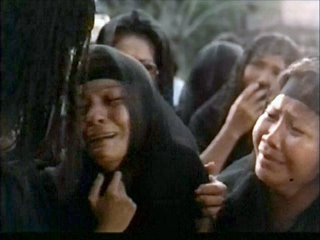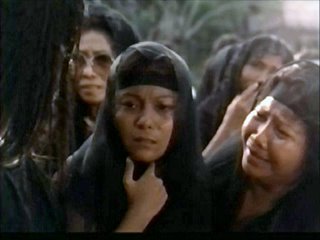By Joel David
As Published From The National Pastime For Contemporary Philippine Cinema
Award-sweeping became the in thing, what with the addition of more and overlapping bodies to the already flourishing FAMAS, URIAN, MMFF, and CMMA to wit, the Philippine Movie Press Club (PMPC) with its STAR Awards and the Film Academy Of The Philippines (FAP). Two of these, the FAP and the FAMAS, claim to be industry-based recognitions, although the FAP is more systematically organized according to guilds; this advantage of legitimacy also brings with it the disadvantage of the prevalence of popularity choices, just as between the URIAN and STAR, the former may comprise a number of serious critics, but the latter possesses the humility necessary for thoroughgoing review and evaluation processes
Despite the propensity of these groups, both collectively and as individual bodies, in setting records for favored artists, the outstanding performance of the period belongs to that of Nora Aunor in Himala, which was honored only by the Metro Manila Film Festival. Ms. Aunor had been possessed with a search for superior acting vehicles, and threw away a lot of her own money in the process, since in essence she mostly had to run against the preferences of her mass supporters. With Lino Brocka she made perceptible strides in ensuring her lead over the rest of the pack, particularly in Ina Ka Ng Anak Mo and Bona. But all that was really required of her was a project that had enough scope to demonstrate her far-reaching prowess, with a minimum of editorial manipulation. In Himala the director and writer seemed to have agreed to a mutual stand-off, thus amplifying the theatrical potential of an expansive locale with a protracted takes, stage-trained talents ensured the competent execution of histrionic stylizations, with the climax set on an open-air platform before a hysterical audience. It was a truly great actress' opportunity of a lifetime, and Nora Aunor seized it and made it not just her role, but her film as well.
Not since Anita Linda in Gerardo de Leon's Sisa (circa the First Golden Age Of Philippine Cinema) had there been such a felicitous exploitation by a performer of ideal filmaking conditions and in this instance, Himala has the decided advantage of being major-league and universal. Other consistent stand-outs during the period - and these would be formidable enough as they are demand to be taken in terms of body of work, not any individual movie. Vic Silayan for Ligaw Na Bulaklak, Kisapmata and Karnal, Gina Alajar for Brutal, Salome, Moral and Kapit Sa Patalim Bayan Ko and Nora Aunor for whatever title she appeared in during the eighties, regardless of budget, intention, or box-office result. Record-setters of this period, specifically Phillip Salvador, Nida Blanca, and Vilma Santos, deserve mention only for the skills and supreme good fortune necessary in attaining their respective feats. Among newcomers, only Jaclyn Jose of Private Show and Takaw Tukso seems to hold forth promise of an order comparable to most of those listed herein.









1 comments:
i couldn't agree more with your thoughts jeremiah! the Superstar's performance is truly one for the books. she may not have won awards for her remarkable turn as the fake vionary Elsa in the Bernal classic Himala but the accolades that she still receives up to now is proof that great acting cannot be ignored.
Post a Comment